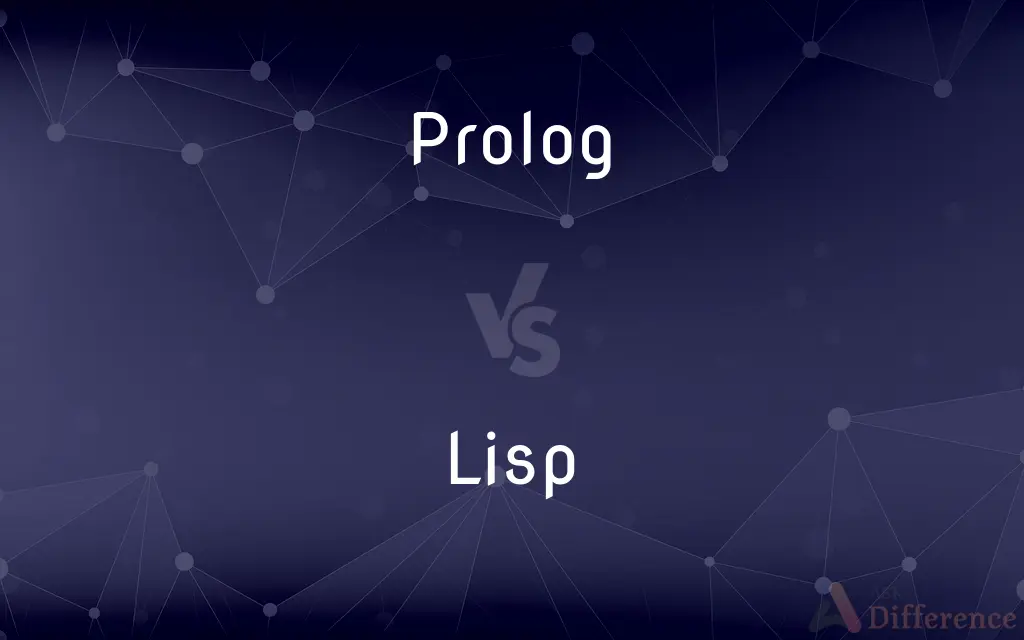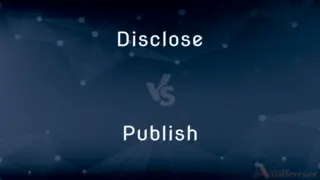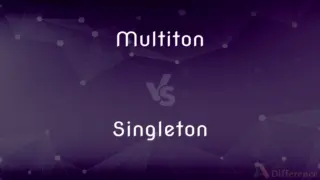Prolog vs. Lisp — What's the Difference?
Edited by Tayyaba Rehman — By Fiza Rafique — Updated on September 22, 2023
Prolog is a logic programming language mainly used for symbolic reasoning and artificial intelligence. Lisp is a general-purpose, multi-paradigm language that excels in symbolic computing and is known for its parentheses-heavy syntax.

Difference Between Prolog and Lisp
Table of Contents
ADVERTISEMENT
Key Differences
Prolog and Lisp are both programming languages, but they differ significantly in their paradigms and primary uses. Prolog is a declarative language that is particularly strong in logic-based computation and symbolic reasoning. It works based on facts and rules, aiming to solve problems by searching through potential solutions.
Lisp, on the other hand, is known for its flexibility and is more of a general-purpose language. It is designed to support multiple programming paradigms, including functional and procedural styles. Lisp is often used for artificial intelligence, machine learning, and natural language processing, although its applications are much broader.
While Prolog's syntax is more focused on predicate logic, Lisp's is characterized by its frequent use of parentheses, which define both the code structure and data format. This makes Lisp highly extensible, allowing users to create new functions and syntax easily.
Prolog tends to be used more in specialized fields like expert systems, natural language processing, and theorem proving. Lisp, meanwhile, has a broader range of applications and is often utilized in complex systems requiring adaptability and extensibility.
In summary, Prolog specializes in logic-based computations and rule-based problem solving, whereas Lisp is a versatile language that accommodates various programming paradigms. Both have made significant contributions to the field of artificial intelligence but are tailored for different types of projects.
ADVERTISEMENT
Comparison Chart
Paradigm
Logic Programming
Multi-paradigm (including functional and procedural)
Primary Uses
Symbolic reasoning, AI, expert systems
General-purpose, AI, symbolic computation
Syntax
Predicate logic
Heavy use of parentheses
Extensibility
Limited
Highly extensible through macros
Community and Libraries
More niche, specialized libraries
Broader community, extensive libraries
Compare with Definitions
Prolog
Used for symbolic reasoning and AI.
Prolog is popular in the field of artificial intelligence.
Lisp
Used for symbolic computation and AI.
Lisp is commonly used in artificial intelligence research.
Prolog
Used in expert systems and theorem proving.
Prolog is widely used for creating automated reasoning systems.
Lisp
Supports functional and procedural programming.
Lisp is versatile enough to support different programming styles.
Prolog
A programming language specializing in logic-based computation.
Prolog is used to build expert systems.
Lisp
Highly extensible through macros.
Lisp allows for high levels of customization via macros.
Prolog
Operates on facts and rules.
In Prolog, you define facts and rules to solve problems.
Lisp
A general-purpose, multi-paradigm programming language.
Lisp can be used for a variety of software projects.
Prolog
Known for its declarative style.
Prolog's syntax allows for easy expression of complex logic.
Lisp
Known for its heavy use of parentheses.
Lisp's unique syntax involves a lot of parentheses.
Prolog
Prolog is a logic programming language associated with artificial intelligence and computational linguistics.Prolog has its roots in first-order logic, a formal logic, and unlike many other programming languages, Prolog is intended primarily as a declarative programming language: the program logic is expressed in terms of relations, represented as facts and rules. A computation is initiated by running a query over these relations.The language was developed and implemented in Marseille, France, in 1972 by Alain Colmerauer with Philippe Roussel, based on Robert Kowalski's procedural interpretation of Horn clauses.Prolog was one of the first logic programming languages and remains the most popular such language today, with several free and commercial implementations available.
Lisp
A lisp is a speech impairment in which a person misarticulates sibilants ([s], [z], [ts], [dz], [ʃ], [ʒ], [tʃ], [dʒ]). These misarticulations often result in unclear speech.
Prolog
An introduction or preface, especially a poem recited to introduce a play.
Lisp
One of the first high-level programming languages, designed to handle complex data structures. It is widely used in artificial intelligence research.
Prolog
An introduction or introductory chapter, as to a novel.
Lisp
A speech defect or mannerism characterized by mispronunciation of the sounds (s) and (z) as (th) and (th).
Prolog
An introductory act, event, or period.
Lisp
A sound of or like a lisp
"The carpenter['s] ... plane whistles its wild ascending lisp" (Walt Whitman).
Prolog
A speech or section used as an introduction, especially to a play or novel.
Lisp
To speak with a lisp.
Prolog
(computing) A component of a computer program that prepares the computer to execute a routine.
Lisp
To speak imperfectly, as a child does.
Prolog
Prologue.
Lisp
To pronounce with a lisp.
Prolog
A declarative higher-level programming language in which instructions are written not as explicit procedural data-manipulation commands, but as logical statements. The language has built-in resolution procedures for logical inference.
Lisp
The habit or an act of lisping.
He used to have a terrible lisp before going to a speech therapist.
It's common for children to speak with a lisp.
Prolog
A computer language designed in Europe to support natural language processing
Lisp
To pronounce the consonant ‘s’ imperfectly; to give ‘s’ and ‘z’ the sounds of ‘th’ (lang=en). This is a speech impediment common among children.
Until the age of 10, Dominic would lisp, but this was fixed by a speech therapist.
Lisp
To speak with imperfect articulation; to mispronounce, such as a child learning to talk.
Lisp
(archaic) To speak hesitatingly and with a low voice, as if afraid.
Lisp
(archaic) to express by the use of simple, childlike language.
Lisp
(archaic) To speak with reserve or concealment; to utter timidly or confidentially.
To lisp treason
Lisp
To pronounce the sibilant letter s imperfectly; to give s and z the sound of th; - a defect common among children.
Lisp
To speak with imperfect articulation; to mispronounce, as a child learning to talk.
As yet a child, nor yet a fool to fame,I lisped in numbers, for the numbers came.
Lisp
To speak hesitatingly with a low voice, as if afraid.
Lest when my lisping, guilty tongue should halt.
Lisp
To pronounce with a lisp.
Lisp
To utter with imperfect articulation; to express with words pronounced imperfectly or indistinctly, as a child speaks; hence, to express by the use of simple, childlike language.
To speak unto them after their own capacity, and to lisp the words unto them according as the babes and children of that age might sound them again.
Lisp
To speak with reserve or concealment; to utter timidly or confidentially; as, to lisp treason.
Lisp
A high-level computer programming language in which statements and data are in the form of lists, enclosed in parentheses; - used especially for rapid development of prototype programs in artificial intelligence applications .
Lisp
A speech defect that involves pronouncing s like voiceless th and z like voiced th
Lisp
A flexible procedure-oriented programing language that manipulates symbols in the form of lists
Lisp
Speak with a lisp
Common Curiosities
What is Lisp?
Lisp is a general-purpose, multi-paradigm programming language often used for symbolic computing.
What is Lisp mainly used for?
Lisp is used for a variety of applications including AI, machine learning, and symbolic computing.
What is Prolog mainly used for?
Prolog is mainly used for expert systems, theorem proving, and AI.
Is Prolog extensible?
Prolog is less extensible compared to Lisp, which is highly extensible through macros.
Which language has a broader community?
Lisp generally has a broader community and more extensive libraries.
How does Prolog's syntax differ from Lisp's?
Prolog uses predicate logic for its syntax, while Lisp is known for its heavy use of parentheses.
Which is older, Prolog or Lisp?
Lisp is older; it was developed in the late 1950s, while Prolog was developed in the 1970s.
Is Prolog good for general-purpose programming?
Prolog is not commonly used for general-purpose programming; it's more specialized.
What is Prolog?
Prolog is a logic programming language primarily used for symbolic reasoning and AI.
Can I use Lisp for logic programming?
While not designed for it, Lisp can be adapted for logic programming.
How do Prolog and Lisp differ?
Prolog specializes in logic-based computation, while Lisp is a versatile language supporting various programming paradigms.
Do both languages support AI development?
Yes, both are popular choices for AI, although they are used for different subdomains.
Is Lisp good for beginners?
Lisp's syntax can be unusual for beginners but is considered a good learning tool.
Which language is more efficient for rule-based systems?
Prolog is generally considered more efficient for rule-based systems and logical queries.
Are both languages still in use?
Yes, both languages are still in use, particularly in academia and specialized industries.
Share Your Discovery

Previous Comparison
Disclose vs. Publish
Next Comparison
Multiton vs. SingletonAuthor Spotlight
Written by
Fiza RafiqueFiza Rafique is a skilled content writer at AskDifference.com, where she meticulously refines and enhances written pieces. Drawing from her vast editorial expertise, Fiza ensures clarity, accuracy, and precision in every article. Passionate about language, she continually seeks to elevate the quality of content for readers worldwide.
Edited by
Tayyaba RehmanTayyaba Rehman is a distinguished writer, currently serving as a primary contributor to askdifference.com. As a researcher in semantics and etymology, Tayyaba's passion for the complexity of languages and their distinctions has found a perfect home on the platform. Tayyaba delves into the intricacies of language, distinguishing between commonly confused words and phrases, thereby providing clarity for readers worldwide.














































